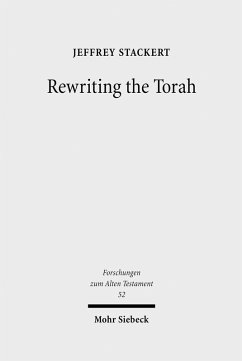Jeffrey Stackert explores literary correspondences among the pentateuchal legal corpora and especially the relationships between similar laws in Deuteronomy and the Holiness Legislation (Lev 17-26, the so-called 'Holiness Code,' as well as significant parts of the Priestly source elsewhere in the Pentateuch). Resemblances between these law collections range from broad structure to fine detail and include treatments of similar legal topics, correlations with regard to sequence of laws, and precise grammatical and lexical correspondences. Yet the nature and basis of these resemblances persist as debated points among biblical scholars. Through an analysis of the pentateuchal laws on asylum, seventh-year release, manumission, and tithes, the author argues that the Holiness Legislation depends upon both the Covenant Collection and Deuteronomy. He also elucidates the compositional logic of the Holiness legislators, showing that these authors do not simply replicate pre-existing legal content. Rather, they employ a method of literary revision in which they reconceptualize source material according to their own ideological biases. In the end, the Holiness Legislation proves to be a 'super law' that collects and distills the Priestly and non-Priestly laws that precede it. By accommodating, reformulating, and incorporating various viewpoints from these sources, the Holiness authors create a work that is intended to supersede them all. Born 1977; Ph.D. in Near Eastern and Judaic Studies from Brandeis University (Waltham, Massachusetts); currently Assistant Professor of Hebrew Bible at the University of Minnesota.
Dieser Download kann aus rechtlichen Gründen nur mit Rechnungsadresse in A, B, BG, CY, CZ, D, DK, EW, E, FIN, F, GR, HR, H, IRL, I, LT, L, LR, M, NL, PL, P, R, S, SLO, SK ausgeliefert werden.


